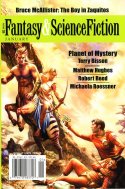
| Editor: | Gordon van Gelder |
| Issue: | Volume 110, No. 1 |
| ISSN: | 1095-8258 |
| Pages: | 162 |
This felt like an average issue in quality. A few interesting stories, a few good ideas, nothing particularly good or bad. It does feature a rare serialization, the first half of a long novella or short novel by Terry Bisson, but even it wasn't anything particularly special. The book review column by Charles de Lint wasn't bad, and Elizabeth Hand particularly liked The King in the Window, which I'm now faintly tempted by.
"Less than Nothing" by Robert Reed: This story of a lost tribe of Native Americans, a haunted young teenager, and their interactions with a neighboring farm family struck me as rather atypical for Reed. Usually he doesn't write stories this focused on the wilderness. The SFnal content was very light, consisting mostly of the ghost (who has little direct effect on the world). The focus is more on the tradeoffs of traditional life against assimilation into a different but richer culture, the advantages and disadvantages of hiding, and choices about how to live. It poses the question engagingly enough, with a slow revelation, but I was unsatisfied with the ending. (6)
"Planet of Mystery, Part I" by Terry Bisson: This is just the first half of the story, so I can't judge fully yet, but so far I'm not impressed. It's a pastiche of an old-style planetary exploration space opera with significant allusions to Solaris, but the world is too obviously artificial and the repeated declarations of the protagonist that everything must be fake are tedious. Crash-landing on Venus and discovering an earth-like world with Amazons and centaurs isn't the most appealing concept to start with; add a collection of characters I care nothing about, and there wasn't much to keep me reading. (4)
"Shadow Man" by Matthew Hughes: This creepy story about a serial killer is far darker than Hughes's normal fare. Serial killers reading and learning about other serial killers is bad enough; Hughes takes it another step with a plausible reaction to time travel. That's about all there is to it, so your enjoyment will depend on how much you like pondering a disturbing idea. (6)
"Horse-Year Women" by Michaela Roessner: Here, the fantasy content is mostly in bits of myth, but it's interesting Chinese myth about women born in the year of the horse and their offspring. I liked the subversive twist and the idea of an independent colony of women. I'm not as sure how well the integration with the contemporary story worked, but it was worth reading and the characterization is strong. (6)
"A Daze in the Life" by Tony Sarowitz: Another short idea exploration, this one of people who rent their minds out to the government as extra processing capacity. I didn't really buy the motivations of the protagonist, but it still makes for a satisfying cautionary tale. It would have been better if it had been a bit longer, with enough room to dive into motivations and flesh out the characters. (6)
"Journey to Gantica" by Matthew Corradi: Good basic concept, about the path of a journey out into the world, both learning the world and escaping a place where one doesn't fit in, and then showing how maturity and experience can change one's interactions with the past as well as the future. I think the middle section dragged on a bit (or I missed additional symbolism and analogy that would have given it more punch), but I liked this response to the idea that you can't go home again. There was also a nice, subtle touch on how people seem different once you know where their life is kept. Satisfying on a metaphorical level. (7)
"The Boy in Zaquitos" by Bruce McAllister: An interesting if predictable story about a former CIA agent who spread disease. The matter-of-fact descriptions of the psychological damage caused by the work fit, as did the notion that governments would employ people to do this sort of thing and the way that the protagonist wanders sideways into the job. The cliched moment when he can't go through with his normal mission didn't do a lot for me, but as a cynical look at government atrocities and uncaring public reaction, it's sharply uncomfortable. (6)
Reviewed: 2006-06-22